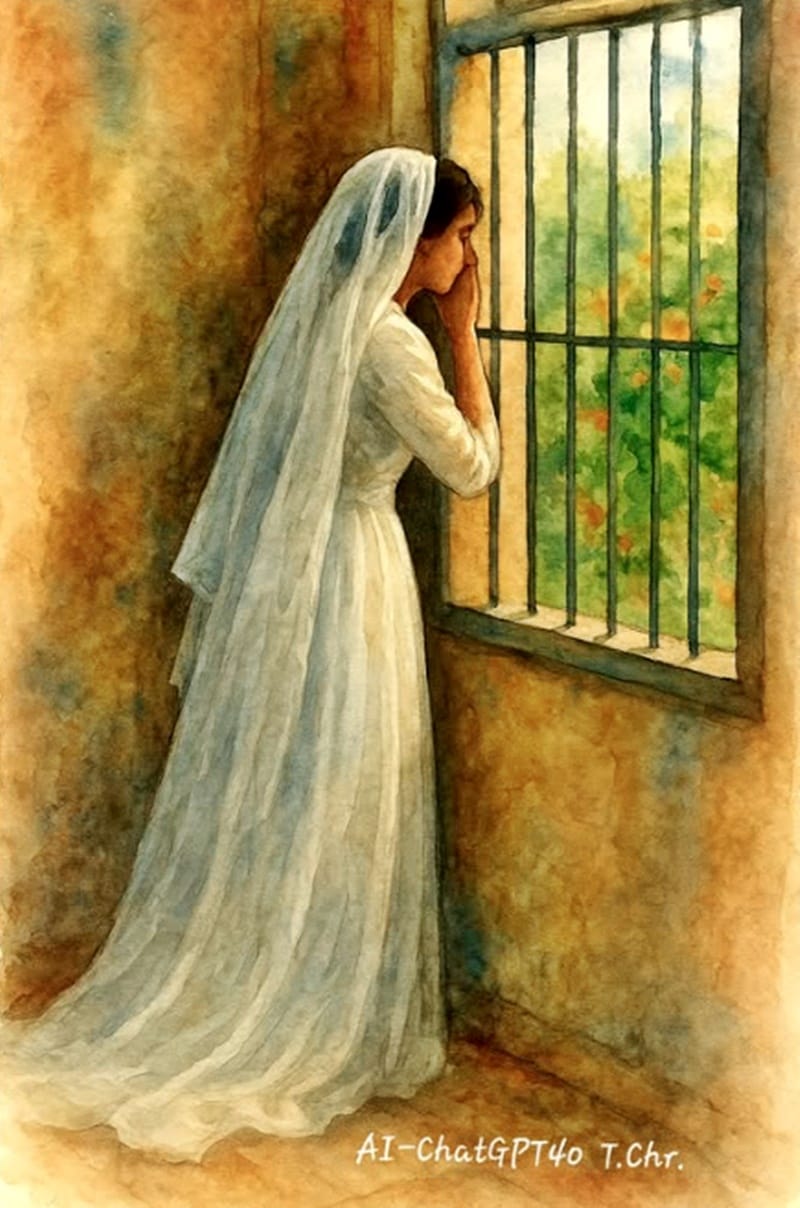The Garden Beyond the Bars

— A Novella Inspired by Gibran's "The Broken Wings" —
By AI-ChatGPT4o-T.Chr.-Human Synthesis-25 June 2025
I. The Quiet Before Her
Beirut had a way of keeping secrets. Its streets murmured with centuries of memory, its skies hung heavy with scent—of oranges in spring, of sea salt in the heat, of old incense rising from dim-lit chapels. I walked through it like a man newly born, my heart unguarded, my eyes too eager. I did not know then that love could find you not with a flourish but with a hush.Selma came into my life not as a storm, but as a pause.
A stillness. She was the daughter of a family older than the city walls, with a gaze that seemed to recognize the sadness in me before I knew it myself. I first saw her in the garden behind the church—sunlight rippling across her dark hair as she fed crumbs to the doves. Her presence was so complete it made the world around her fall quiet. And in that silence, something in me stirred—a prayer I had never learned but somehow always carried.
II. The Language of Hands
We did not speak of love. Not at first. Beirut, for all its opulence, had a way of cloaking desire beneath layers of custom. Our meetings were accidental by design, but I began to live only for them. A brush of fingers in the corridor of her father’s home. A shared smile at the corner of the market. Words passed like folded letters in the eyes of a city that pretended not to watch.Selma’s voice was quiet, but her silences thundered.
She would listen as I spoke of books and questions I dared not ask in the presence of elders. She never interrupted. Her stillness was not submission—it was listening sharpened into art. I began to dream of a life where that gaze would greet me each morning, where no locked door would separate our truths. But I had mistaken dreams for destiny.
III. The House Without Windows
She was married in a ceremony so beautiful it felt cruel. The church bells sang like mourning doves. Her wedding dress glowed against the dusk, white as surrender. I stood among the guests, clapping as if the rhythm would drown the sound of my own breaking.Her husband was a man of prestige and calculation. He did not look at her the way one looks at a woman, but the way one appraises property. I would pass their house some evenings, pretending not to hope, and sometimes I would see her at the window—forehead pressed to the bars, not crying, not screaming, simply watching.
As if the world had locked her out.She endured. That was what they praised in her. Her ability to disappear without complaint. To fold herself into the shape expected of her. “They measure me,” she once said, “by what I can endure, not what I can become.” I never forgot that. Not because it was new, but because I had heard versions of it from every woman I loved and never saved..
IV. Between the Stars and the Soil
We met again, in secret, behind the garden walls. There was no fear—only a terrible peace, the kind that comes when nothing more can be taken from you. We sat on worn stone benches beneath jasmine and silence. We did not speak of escape. There was no such thing.“Do you believe love can exist without future?” I asked.She looked at me with pity—not for me, but for the question.“Love,” she said, “isn’t a promise. It’s a fire. It doesn’t ask what wood it burns.”We were fire. We burned.
V. The Wintering
She died one spring. Quietly. The city bloomed. The markets thrived. The sea whispered as it always had. But I knew something was wrong in the pattern of the world. I visited her grave on days the wind would carry her name. I brought no flowers—only words.I told her of the books I was reading. Of the revolutions I dreamed of. Of the life we could have had in a quieter country, under an unknowing sky. I whispered her name until it no longer felt like mine.
VI. What Remains
They call it a love story. But it is not.It is a haunting.We all carry ghosts—not of people, but of possibilities. The man I might have become beside her. The woman she might have become beside no one. The garden that might have bloomed forever. The child we might have named. The letters we never wrote.
Gibran taught me this: that love, when denied, doesn’t vanish. It becomes air. It becomes the scent of orange blossoms in an empty room. It becomes silence that answers your prayers when no one else is listening.Selma is gone.And yet she is everywhere.In the quiet. In the wind. In the garden beyond the bars.
VII. The Garden Is Gone
I returned many years later. The streets were louder, more hurried. The faces of Beirut had changed; so had its rhythm. But I found the old quarter, the church still standing in faded stone, and behind it—what once was her garden.It was gone.In its place stood a square building, blank and gray, a municipal office without windows. No jasmine, no birds, no bench worn by secret meetings. The air no longer held her scent. Even the wind had forgotten the name it used to carry.
I stood in silence where the garden had been, unsure if I was mourning her again, or the self I had left behind.Perhaps all gardens go, eventually. Beauty, once alive, cannot stay rooted in one place. It travels—in memory, in scent, in silence. And so I closed my eyes, and tried to remember not just the place, but the feeling. The way her hand lingered near mine. The way she said "fire."Even now, I still feel it.Not in the earth. Not in stone.But in the spaces between.
VIII. A Philosophical Afterword
What is love, if not the longing to transcend the borders of our own fate?We speak of love as union, as arrival. But perhaps the greatest loves are those that never fully materialize. They live not in fulfillment, but in tension—in the ache between nearness and impossibility. Love like this sharpens the soul; it carves meaning into the everyday. It teaches us how to carry fire without burning, how to mourn without bitterness.Selma’s story is not singular. It is the tale of anyone who has lived beneath a ceiling too low for their spirit.
Anyone who has watched beauty held hostage by custom. Anyone who has whispered the truth in silence because the world offered no space for its echo.In this way, she was not only beloved. She was sacred.And though her body passed, the echo of her defiance, her tenderness, and her quiet fire lives on—in gardens torn down, in names forgotten, in men and women who still choose love, even when the world gives them no future.
The garden is gone. But the seed remains.And so do we.
